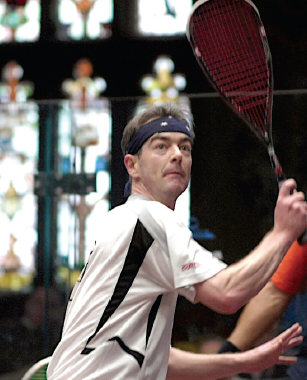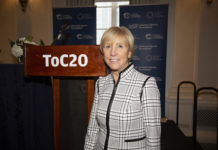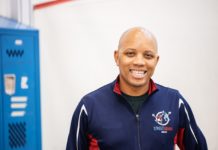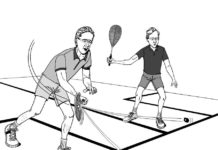Mick Joint, Head Pro at the Detroit Athletic Club
 Where did you grow up?
Where did you grow up?
I was born and raised in Melbourne, Australia.
How did you get involved with squash?
My mother introduced me to squash when I was five. I used to jump on a spare court and hit around while she played with her friends. She said it was difficult to get me off when it was time to go home.
Did any other family members play?
Not really. My older brother dabbled a little but never took it seriously.
Who was your first teacher?
My first ‘real’ coach was Bryan Galt-Smith. I still hold very fond memories of Bryan and the generous time he spent with me and the patience he showed. He was the one who taught me the reverse-boast from the back corner—a shot I still use on occasion today and still catch people flat-footed with it. When I was 14, Bryan recommended I move on to my next coach who also had a huge influence on me—John Larkin. John was such a disciplinarian and expected nothing less than maximum effort all the time. It was with John that I learned that mental toughness was just as important as the physical.
Did you play squash in college?
No. I didn’t go to college. (Gasp!) Squash in Australia does not work the same as here in the States. There isn’t an “NCAA” so to speak. I left Australia when I was 19 to explore the world. I landed in Argentina, played and coached there for 2 1/2 years before moving onto Germany for the next 5 1/2 years. Then back to Melbourne for 3, off to Montreal for 3, and now in Detroit for the past 6 years…phew!
Do you still compete?
Only in events close to home. I probably play half a dozen tournaments a year around the midwest area, Windsor and London (Ontario).
Describe the squash scene in Detroit?
Detroit has a small squash community. While the squash programs in the two major clubs in Detroit are thriving (Detroit Athletic Club where I work, and the Birmingham Athletic Club), the sport is struggling everywhere else. The travel league is on life-support, there are very few tournaments in the state, and the membership to the MSRA (Michigan Squash Racquets Association) is dwindling. While the MSRA have improved in some areas over the past couple of years, more obviously needs to be done. While better communication and cooperation within the squash community is undoubtedly essential, one of the most important steps for the MSRA is to once again be a recognized Association in the eyes of U.S. SQUASH (we have not been for a number of years now), and start utilizing the benefits U.S. SQUASH offers.
The differences between coaching an adult and a junior?
I find I can move a little faster with juniors. They (generally) soak up the instruction much quicker and easier than adults. On the other hand, juniors get over-confident too easily and sometimes it becomes an attitude problem. I believe you have to teach mental toughness when they are young, get them into good habits early. Adults tend to be more realistic in that regard and know the next drubbing could be just around the corner. But whether I coach a junior or adult, the one common denominator is that they have to enjoy it.
Among the others in the US, whom do you look to as the ideal teaching pro?
I love my job but I know the amount of work required to run a successful program. I respect any pro that can do that. Every club has different requirements, and every pro has their own style.
What is your favorite shot to hit?
I can’t say I shy away from going for a nick on occasion, but I really get a kick out of the deceptive flick and sending people the wrong way…maybe the deceptive flick that also hits the nick?





